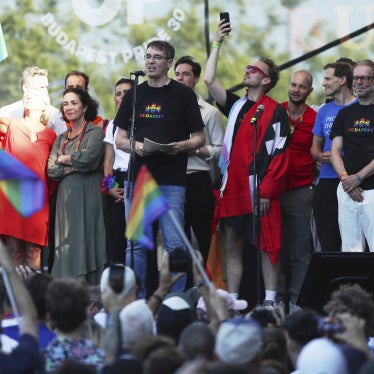Valdis Zalters
President of the Republic of Latvia
Chancery of the President of Latvia
Pils Square 3, Riga, LV - 1900, Latvia
Saeima
Parliament of the Republic of Latvia
Latvijas Republikas Saeima
Jēkaba Iela 11, Rīga, LV-1811, Latvia
Juris Jansons
Ombudsman of the Republic of Latvia
Baznīcas Street 25, Riga, LV-1010, Latvia
Dear President Zalters,
Dear Members of the Latvian Parliament,
Dear Mr. Jansons,
On behalf of Human Rights Watch, I urge you to approve the proposal, recently submitted to the Latvian Parliament by Mozaika, the Latvian Alliance of Lesbian, Gay, Bisexual, Trans People and their Friends, to legalize registered partnerships for same-sex couples.
Human Rights Watch is an independent organization dedicated to defending and protecting human rights. We investigate and expose human rights violations. We work in more than 90 countries in the world. In Europe we have offices in Brussels, London, Paris, Berlin, Geneva, Moscow and Amsterdam.
We welcome President Zalters' recognition, as reported by the media on May 18, that "it is a duty of the state to help" same sex couples, and that the issue should be debated.
Same-sex partners are currently discriminated against in Latvia, as they have no options for their relationships to be recognized under the law; thus rendering their rights, including property, inheritance, and social security rights, without legal protection. Although Latvian law does not recognize cohabiting different-sex partners either, such couples at least have the option to marry unlike same-sex partners.
Introducing a registered partnership law for same-sex partners would not undermine the provision in the Latvian Constitution which defines marriage as a union between a man and a woman. Instead it will create a legal framework for same-sex partners who are currently left without any legal recognition and protection. Other EU member states, such as Germany, Hungary and Ireland, define marriage as a union between a man and a woman, and both states have adopted registered partnership laws specifically for same-sex partners.
To date, 17 out of 27 European Union member states have laws in place which recognize same-sex partnership in one form or another. Equality and non-discrimination, including on the grounds of sexual orientation, are well-established principles of the European Union, and they are enshrined in Article 21 of the Charter of Fundamental Rights, which states that "Any discrimination based on any ground such as sex, race, color, ethnic or social origin, genetic features, language, religion or belief, political or any other opinion, membership of a national minority, property, birth, disability, age or sexual orientation shall be prohibited."
Legal recognition and protection of the family lives of same-sex couples is also required by human rights law, and in particular by Article 8 of the European Convention on Human Rights to which Latvia is a party. Article 8 protects amongst other related rights, the right to private and family life.
In the case of Schalk and Kopf v. Austria (application no. 30141/04) the European Court of Human Rights in Strasbourg noted on November 22, 2010 ... "that since 2001... a rapid evolution of social attitudes towards same-sex couples has taken place in many member States. Since then a considerable number of member States have afforded legal recognition to same sex couples...In view of this evolution the Court considers it artificial to maintain the view that, in contrast to a different-sex couple, a same-sex couple cannot enjoy "family life" for the purposes of Article 8. Consequently, the relationship of the applicants, a cohabiting same-sex couple living in a stable de facto partnership, falls within the notion of "family life", just as the relationship of a different-sex couple in the same situation would."
In the case of Kozak v. Poland (application no. 13102/02) the European Court of Human Rights ruled on June 2, 2010 that... " protection of the family in the traditional sense is, in practice, a weighty and legitimate reason which might justify a difference in treatment...However, in pursuance of that aim a broad variety of measures might be implemented by the State.....The State, in its choice of means designed to protect the family and secure, as required by article 8, respect for family life must necessarily take into account developments in society and changes in the perception of social, civil status and relational issues, including the fact that there is not just one way or one choice in the sphere of leading and living one's family or private life....A blanket exclusion of persons living in a homosexual relationship from succession to a tenancy cannot be accepted by the Court as necessary for the protection of the family viewed in its traditional sense."
The Council of Europe as an institution has also taken a strong stance against inequality and discrimination on the basis of sexual orientation. On March 31, 2010, the organization's Committee of Ministers - its highest decision making body which brings together all 47 member states, including Latvia -agreed on a set of recommendations for measures to combat discrimination on the grounds of sexual orientation or gender identity . The recommendations call on member states to "ensure that legislative and other measures are adopted and effectively implemented to combat discrimination on grounds of sexual orientation or gender identity, to ensure respect for the human rights of lesbian, gay, bisexual and transgender persons and to promote tolerance towards them."
We urge you to support the recognition of same-sex partnerships in Latvia. We believe Latvia's rightful place is among the countries that uphold and practice the highest standards of human rights. We therefore hope to see Latvia join the growing number of EU member states that have legalized same-sex partnerships.
Sincerely,
Boris O. Dittrich
Advocacy director
Lesbian, Gay, Bisexual and Transgender Rights Program
Human Rights Watch






